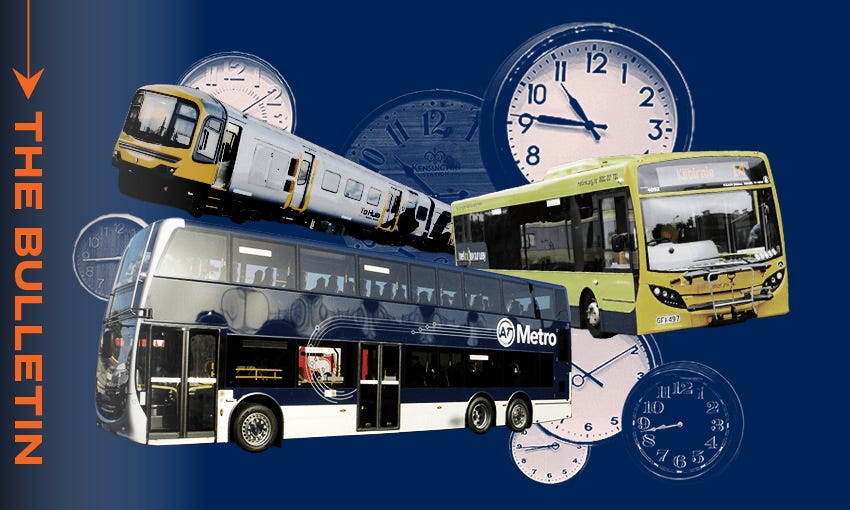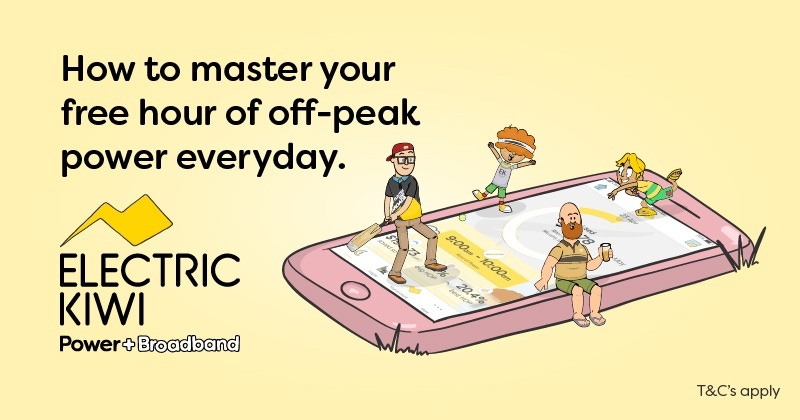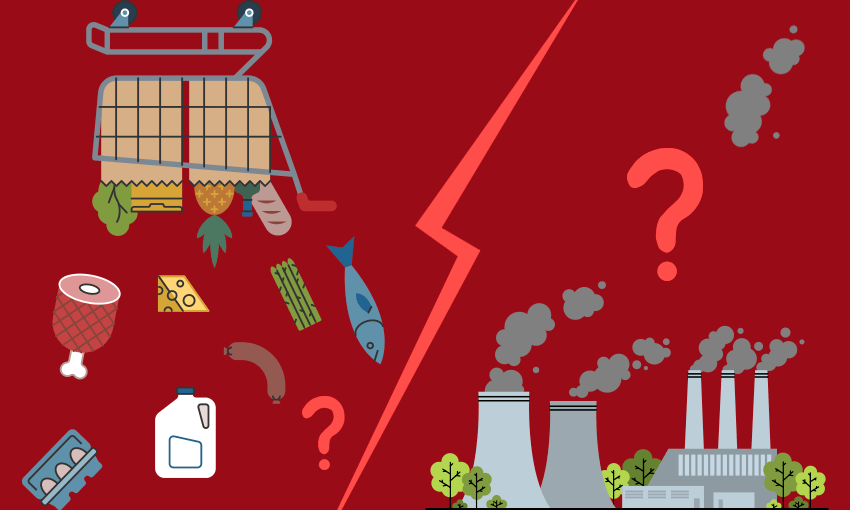Auckland Transport knows things are bad, but is it holding itself accountable?
As the city's public transport woes continue, there are calls for AT to do more to show it grasps the huge scale of the problem.
Mōrena and welcome to The Bulletin for Wednesday, April 26 by Catherine McGregor. Presented in partnership with Z Energy.
In today’s edition: D-day for IRD’s investigation into New Zealand’s wealthiest individuals; a sharp rise in junior doctors leaving before training as specialists; stress tests for first home buyers on the rise. But first, new data shows Auckland’s public transport users have never been more dissatisfied.
User satisfaction with Auckland transport hits a low
Heading back to work after a day off is always tough – it’s even tougher when you’re one of the hundreds of thousands of Aucklanders who rely on public transport to get to work. According to RNZ’s live counter, embedded here, a total of 1040 Auckland buses were cancelled on Monday, and the number has been roughly the same for months. No wonder user satisfaction is at an all-time low. As Toby Manhire reports this morning on The Spinoff, in one week in March, just 19% of respondents to a survey of Hop card customers said they were satisfied with public transport services in Auckland, the worst result in the survey’s history. In an internal note accompanying the figures, an Auckland Transport (AT) specialist wrote that “customers are losing confidence in our ability to provide an acceptable service, with some commenting that it is no longer worth it to use public transport”. AT’s Mark Lambert tells Manhire he understands users’ frustration. "I’m a regular public transport user too and I appreciate that it is tough at the moment with the state of the network,” he says. But with driver recruitment improving and efforts to improve rail alternatives underway, “there is a light at the end of the tunnel”.
Where’s the accountability?
The RNZ data viz linked to above has been reporting bus cancellations for three weeks now – a valuable service, but one that AT should be publishing themselves, writes Matt Lowrie of the transport blog Greater Auckland, “in order to show that they understand the issue, as well as the things they’re doing to try and make the situation better”. Writing in the Herald, Simon Wilson (paywalled) agrees that AT needs to exercise a lot more self accountability. His off-the-wall suggestion, inspired by a recent Harry Styles transport disaster: AT should promise to pay for an Uber if your bus doesn’t come. “What a financial and logistical nightmare that would be, day after day, writ large across the city,” Wilson admits. “But hear me out. A promise to pay for Ubers will force AT to do whatever it takes to fix the bus services.” Wilson doesn’t agree with Mayor Wayne Brown on a lot, but he does back Brown’s view that AT has focused on expensive infrastructure while ignoring easy wins. “Brown argues that compared to building new projects, squeezing all the potential out of what’s already there has been badly neglected. He is right.”
Cyclists put at risk by public transport failures
Poor public transport encourages more cars onto the road, which risks putting more cyclists in harm’s way. That risk was highlighted this week with the revelation that the actual rate of cyclist injuries in Auckland could be seven times higher than official figures. According to a report requested by AT’s board, “it is clear that there is a big issue with under-reporting in the system”. The news comes as bike lanes fall victim to the council’s cost-cutting drive, including the proposed cycle path between Point Chevalier and Grey Lynn, shelved as part of the re-scoping of the wide-ranging Inner West Projects. Writes Hayden Donnell, a cycle path supporter, there’s some truth to the criticism that too much council money is being spent on “gold-standard infrastructure” for wealthy inner-city suburbs like Westmere and Grey Lynn, and not enough on places like Papakura and Henderson. “It’s time to defund Ponsonby and give it to the suburbs doing their bit,” he argues.
Bus cancellations in Wellington not as bad as originally thought
It’s not just Auckland buses that RNZ data journalist Farah Hancock has been investigating. Her ongoing series has looked at Wellington bus cancellations too, finding that Wellington experienced an average of 448 cancellations each weekday during February. But Metlink, Wellington’s transport operator, tells Hancock the problems “are not as severe as Metlink's own data had initially suggested”. A tech issue had caused the number of cancellations to be overstated, and there were also “some errors in RNZ's analysis”. “Our updated analysis produced different results for Wellington. It shows an average of 296 daily cancellations in Wellington on a typical weekday,” Hancock writes.
What will you do with your Hour of Power?
Not much is free these days, but Electric Kiwi wants you to have an hour of free off-peak power every day, to use at a time that suits you.
This means you could do the vacuuming, charge your EV and run the dishwasher for free!
Analyse your energy usage and learn how to master your Hour of Power with the Electric Kiwi app for iOS and Android, available here. (Sponsored)
Much-anticipated IRD tax report released today
The long-awaited IRD report into the tax paid by New Zealand’s 400 wealthiest individuals lands today, along with another from Treasury looking at the tax burden shouldered by all sectors of society. Wrote Duncan Greive last week, “together these reports are expected to give the most detailed view yet of the financial world of the richest New Zealanders, and just how much tax that wealth generates”. The IRD and Treasury reports will form the research base for any change to New Zealand’s tax regime, Grieve wrote. “After the bonfire of the policies, Labour is about to start announcing some new ones.” Could that include a capital gains tax? We may have a better idea by the end of today. The IRD report will be released around 10.45am this morning, followed by a speech by revenue minister David Parker, who commissioned the research, at 12.30pm.
More junior doctors being ‘lost in the training pipeline’
A sharply increasing number of junior doctors are leaving medicine before undergoing specialist training, RNZ’s Phil Pennington reports. Analysis by the Association of Salaried Medical Specialists puts the loss rate at about 40% compared to 16% a few years ago. Deborah Powell of the Resident Doctors' Association says part of the explanation is that many junior doctors relocate to Australia at the advanced stage of training."They're being actively targeted by Australia,” she says. Both unions say they’re also seeing “a rise in overseas junior doctors doing a short stint here, like a medical OE”, Pennington reports.
A message from Duncan Greive, senior writer, podcast host and founder of The Spinoff.
I founded The Spinoff to fill a hole in our media landscape – to create smart, original writing and content that looks at this country from a different angle. The only reason it exists today is because our members believe in us, and are willing to donate to keep our content free for all. Join us in making a difference to the local media landscape by becoming a member or making a new donation today.
Stress test for first home buyers rising alongside interest rates
Banks are currently “stress testing” prospective mortgage holders at an interest rate of around 8.5%, the NZ Herald reports (paywalled). ANZ says potential customers need to show they can service their debt at an interest rate of 8.6%, ASB’s test rate is 8.75%, and BNZ’s is 8.5%. “Westpac said it tests borrowers at 2.5 percentage points above the rate they’re after. So, if someone wanted to take out a loan with an interest rate of 6.5%, they’d be tested at 9%.” Back in 2021, when mortgage rates were in the 2% range, large banks were testing mortgage applicants at between 5.5 and 6.5%, the Herald notes.
Click and collect
Christchurch’s Sun Dog Diner, an American-style eatery on Papanui Road, went into liquidation owing $100,000 to creditors. Meanwhile the Viaduct Bar, a city institution on Oxford Terrace, has closed for good.
Fox News’ Tucker Carlson – the network’s biggest star and most controversial figure – lost his job yesterday, as did longtime CNN anchor Don Lemon.
After being shelved during Covid, American Airlines’ Auckland-Los Angeles route is coming back this summer. The news comes on the heels of United Airlines’ announcement of a new Christchurch-San Francisco summer service, allowing South Islanders to fly direct to the US for the first time.
US president Joe Biden has announced his 2024 re-election campaign.
A strong wind warning has been issued for the central North Island, with gales and snow expected in parts of the South Island.
Got some feedback about The Bulletin, or anything in the news? Get in touch with me at thebulletin@thespinoff.co.nz.
If you liked what you read today, share The Bulletin with friends, family and colleagues.
Gareth Hughes shares five ways New Zealand can tackle climate change and the cost of living. Toby Manhire unearths all the times the NZ Herald’s social media moderators had enough of their commenters’ bullsh*t. Tara Ward finds out why New Zealand can’t get enough of watching houses on the backs of trucks. Charlotte Muru-Lanning explains the story behind a dispute over a sprinkle-covered birthday cake that’s gone viral on social media. And Chris Schulz talks to the owner of a company selling a $2000 jar of mānuka honey.
Sporting snippets
After five months at the top, Lydia Ko has lost her world No 1 ranking after missing the cut at the Chevron Championship in Texas.
Football clubs and sporting venues around the country are part of a multimillion-dollar upgrades project ahead of the Fifa World Cup.
The Warriors have once again failed to beat the Melbourne Storm, going down 30-22 in the teams’ traditional Anzac Day fixture to make it 14 losses in a row.
Elon Musk’s ‘weekend-long master class in business failure’
Any list of the worst product failures of all time has to include Microsoft Zune, Google Glass, New Coke… and now, also Twitter Blue, Elon Musk’s misguided attempt to “democratise” blue check marks (sorry NZ, “blue ticks” just doesn’t sound right) by selling them for US$8 a month, while simultaneously stripping them from the prominent Twitter users who made having a blue check desirable in the first place.
Over the weekend, things got even more ridiculous as Twitter began adding Twitter Blue subscription badges to top tier users at-will, forcing account holders affected – everyone from Stephen King to LeBron James – to publicly state they hadn’t paid up. “It’s an astonishing business story,” writes Alex Kirshner in Slate. “Famous people from every walk of life you could think of have, in the span of a few days, grabbed their megaphones to tell the world they did not pay for a specific product.” With Twitter Blue instantly turned into a literal mark of shame, it’s hard to imagine how the launch could have gone any worse.













